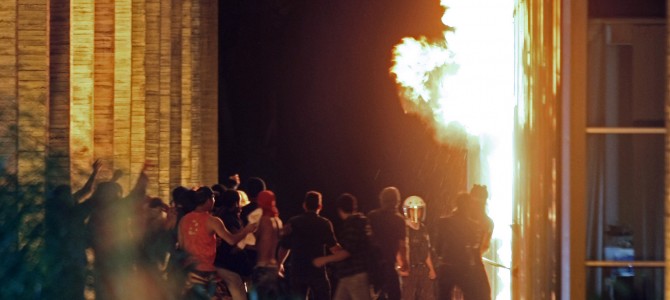
We close 2013 in a world that seems to be swiftly tilting toward ever-larger crises of government legitimacy, oncoming clashes of foreign powers, and an abiding sense of concern on the part of the American people that the economic realities of long-term unemployment, wage stagnation, and the working class squeeze of higher prices for health care, higher education, and basic goods and services are not a brief trend, but enduring problems for which Washington has no solutions.
On the foreign policy front, 2013 may well turn out to be the year in which offered a preface for the Next Big War. From Iran to Syria to China, the American position has collapsed with such rapidity that our understanding of these situations from just a year ago are dramatically altered. The era of the Monroe Doctrine may be over, but the lack of an American grand strategy has left our approach to foreign policy an extended drama of incoherence, and our inability to grapple with the unraveling of the Middle East in the wake of the Arab Spring is only one of many challenges which will present themselves in the coming year. Unrest is only likely to increase in a global economy where youth unemployment has actually increased to the same levels as during the economic crisis.
But the crisis closer to home may be the one which proves more troublesome in the long term: a crisis of legitimacy within Western democracy, one that has gripped the American system in the wake of the mismanagement of elections, disasters, wars, financial crises, stimulus packages, bailouts, and now health care overhauls. Americans are losing faith in the American Dream for themselves and for their children, and they are roughly evenly split on whether the solution to these problems is more government or more liberty – a question which is becoming the defining decision of our era.
This is about more than just who we elect or which party we trust in which arena. It represents a very real schism about first principles and the universe – a division between an approach to life which considers natural law, inherent rights and duties, the rule of law and more as important, and one which views as essential the ongoing actions of the collective to achieve a secular social justice. The shared underlying assumptions about life and the ordering of society, which had such a strong role in America’s early success, are largely gone or greatly diminished. They aren’t coming back.
The rise of the Nones – those who don’t believe in anything in particular, and aren’t interested in investigating faith – is only likely to increase. One in three Millennials profess no religious affiliation, and one of the underestimated aspects of their absence of participation in a faith community of any sort is their lack of interest in seeking one out. Perhaps there’s a silver lining here, from a secularist perspective: a less religious America may sound like a context for less religious strife – fewer people who care, fewer people to argue about it, right? But the reverse is true.
The culture wars haven’t ended – they’ve escalated, and they will continue to escalate in a society where people have fewer commonly held views, and less respect for those who disagree with them for any reason, least of all a religious one. The lack of a shared language of compromise and respect leads to ongoing and increasingly contentious clashes of faith, politics, and sexual rights, where lightning rods of courts and culture lead to flashpoints that strain social bonds, break friendships, and end the ability to have a healthy community where disagreement over law and politics does not lead to death threats on social media.
The next year will bring more flashpoints in the broken public square. In 2014, the highest courts in the land will rule on the ability of Christian business owners to practice their faith as they see fit, and the power of government to compel them to go against their beliefs. We might hope for a country where more people would lay down their arms and view those who disagree with their ideology with respect and impartiality. But for all the handwringing, history has shown us that this is the way things go when trust breaks down and respect vanishes. As G.K. Chesterton notes: “Why should they be impartial, what is being impartial, when the whole world is at war about whether one thing is a devouring superstition or a divine hope?”
Of course, there is still hope. The nation has survived incredible crises before, on the global scale and within our society. The path toward liberty is still a viable one. And perhaps we will find that even when things break down, when government fails and grand strategies fade, the American people can count on each other more than they thought. These are strange times for the country and the world. But we may find that, even as institutions fail us, the American people exceed expectations. They have done it so many times before. In the coming year, they will be called on to do so again.
Ben Domenech is the publisher of The Federalist.








